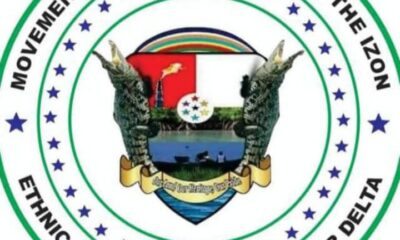Sports
S/Africa 2010: Legalise Sex Trade For World Cup – Health Specialist
Fear of spread of HIV infection football fans sparks demand for registration of South Africa prostitutes.
Calls are growing for South Africa to legalise prostitution ahead of next year’s football World cup in an effort to limit HIV infection among millions of fans visiting the country for the tournament.
A leading health specialists to the Tidesports source that the World Cup presented a huge risk and said there was an urgent need to start registering prostitutes and screening them for the virus. It is estimated that 50% of the country’s sex workers are infected.
Professor Ian Sanne, head of the clinical HIV research unit at Johannesburg’s Witwatersrand University, said the party atmosphere being touted by the football authorities, travel companies and the South African government was a green light to school abuse and promiscuity among fans next summer.
Around 3.2 million tickets will be sold for the matches. A million will go to South African residents, with the rest split between international fans and sponsor. Twenty thousand England fans are expected to head for South Africa, where those without tickets will be catered for with huge screens and temporary bars across the country.
Sanne said not only would the visitors be at risk, but young South Africans and sex workers too, opening the way for the virus to spread at a dramatically increased rate.
“HIV/Aids is a problem globally and there is a great need to encourage and enforce better health and responsibility, especially to the young South Africans who could be at risk during the World Cup,” he said.
He called for legal frameworks to regulate the practice of sex workers rather than discriminate against them.
Interim legalisation of prostitution would be best for the country, rather than leaving it uncontrolled, said. “Sex workers need to register with a board that will regulate their practice and give certification to practice, but they have to go through a mandatory HIV tresting process first, and only those who test negative will be allowed to practice.”
South Africa is the centre of the global HIV epidemic, with more than five million adults infected. An estimated one in two of working prostitutes is living with the virus an dthe lack of medication led to a quarter of a million people dying of Aids-related illnesses there last year. The antiretroviral medication that helps prevent HIV devleopming into ful-blown Aids is being taken by fewer than 30% of those infected.
Infection rates among women aged 15 to 24 declined slightly from 22.1% in 2007 to 21.7% 2008, but among women in the 30 to 34 age group, the infection rate was 40,4 in 2008.
But while Sanne said authorities should use the World Cup as a platform to raise awareness on the need for testing, Aids/HIV campaigners responded furiously that it would take concern for foreigners rather than its own citizen to make the South African government act.
“The clear way forward to help tackle the tens of thousands of women forced into prostitution through poverty is to legalise it now, not to make it a temporary measure for the World Cup,” said Vuyiseka Dubula of the Treatment Action Campaign.
We need preostiution decriminalised now so we can start to help these women, many of whom have been abused and brutalised from a young age.
Former South African police commissioner Jackie Selebi, now suspended over corruption allegations, caused widespread dismay when he first susggested legalising prostitution and public drinking for the duration of the World Cup, arguing that it would free his officers to deal with security, but the issue is hugely contentious in a country where the sex trade is regarded as immoral and un-acceptable.
A spokesman for the FA said: They (English fans) will all be issued with guidance along with their tickets and we are working now on how best to communicate the dos and don’ts in South Africa to people. But the FA can’t be responsible for all the English people travelling to South Africa next summer.
Sports
Chess Championship: Dan-Jumbo Emerges Best Female Player
The third edition of Naphtail Chess Open Championship which ended on Wednesday in Port Harcourt saw Rivers State born Queen Dan-Jumbo emerged best female player in the tournament following her impressive performance.
It was clash of the Titans as top Chess players in Nigeria gathered to chase honours.
The three days competition was held at Vee Hotel, Trans Amadi ,in Port Harcourt and over 80 players in Nigeria registered for the tournament this championship was recognised by International Chess Federation (FIDE).
Speaking with Tidesports in an exclusive interview on Saturday, Dan-Jumbo said her dream was to become Grand Master in Chess worldwide.
According to her, she started playing Chess at the age of 15 but went into it professionally in 2009 as she represented Rivers State in National Sports Festival (NSF) in Kaduna, the same year.
“I started playing Chess in the early 2000s. I picked the interest through my my elder brother as him and his friends always play Chess in our compound so I began to learn it.
” In 2009 I went to National Sports festival in Kaduna represented Rivers State and I won a silver medal on my board.
“In 2011 and 2012 NSFs I won two Gold medals each hosted by Rivers and Lagos States respectively. While in Edo NSF I won bronze medal” Dan-Jumbo said.
The Asari-Toru, in Rivers State born Chess player use the forum to advice upcoming Chess players to be focus, saying losing a game is part of every competition but the most important thing was that you don’t lose hope.
“My advice for upcoming chess players was that don’t lose focus. Even when you lose, find a way to adjust and get back out”, she added.
Tonye Orabere
Sports
Siasia Blames NFF Over FIFA Ban
Former Super Eagles Coach, Samson Siasia says the Nigeria Football Federation supported FIFA to have him banned for alleged involvement in match-fixing in August 2019.
In a recent interview with Athlist, the 56-year-old, whose ban ends in a few months, said the NFF not only refused to support him but also carried out FIFA’s instruction not to let him know he was under investigation by the world football body.
“Nigeria abandoned me at that time of need; that’s my own take on how this thing played out,” the former Eagles striker and member of the 1994 AFCON-winning squad, said.
“It’s an allegation; they said bribery. What is bribery? Is it not when money changes hands? Was there any proof of that? There were none.
“I spoke with someone who was trying to hire me as a coach in Australia. I didn’t know the guy was a match-fixer, but FIFA knew this guy. Why would they allow him to be around any FIFA tournament?
“So, when they found out through emails, our correspondence about how this guy would take me to Australia, I played in Australia, so I felt it would be nice to go back there.
“We talked about how much salaries, transfers, bonuses, and sign-on fees were, and that was all.
“When FIFA was looking for me, I didn’t even know. I am not affiliated with FIFA; their affiliation is with the NFF. So, they went to the NFF and told them not to let me know that they were investigating me. But if they didn’t tell me, how was I supposed to defend my self Siasia added, “Then they sent me a letter, but it went to my spam. It was two days before the ban that I found out that FIFA was looking for me.
Siasia added, “Then they sent me a letter, but it went to my spam. It was two days before the ban that I found out that FIFA was looking for me.
“Then we started to see how we could communicate with them to see how I could have a hearing. But they said the time had elapsed and I should go to the CAS (Court of Arbitration for Sport).
Sports
WADA Plans Review Of Failed Tests
The World Anti-Doping Agency (WADA) will launch an independent review after 23 Chinese swimmers were cleared to compete at the Tokyo Olympics despite testing positive for a banned substance.
WADA has said it was not in a position to disprove an assertion from the China Anti-Doping Agency (CHINADA) that contamination was the source of the heart medication trimetazidine (TMZ) for which the swimmers tested positive.
Findings of the independent investigation, led by Swiss prosecutor Eric Cottier, are expected to be delivered within two months.
“WADA’s integrity and reputation is under attack,” said Wada president Witold Banka.
“WADA has been unfairly accused of bias in favour of China by not appealing the CHINADA case to the Court of Arbitration for Sport.
“We continue to reject the false accusations and we are pleased to be able to put these questions into the hands of an experienced, respected and independent prosecutor.”
United States Anti-Doping Agency (USADA) Chief Executive Travis Tygart said WADA and CHINADA had swept these positives under the carpet, claims WADA described as completely false and defamatory while adding that it had referred the comments to its lawyers.
Aquatics GB said it was extremely concerned by the allegations, which it said threatened “potential loss of trust and reputational damage to sport”.
WADA was notified of CHINADA’s decision in June 2021, ahead of the delayed Games, and said it had no evidence to challenge China’s findings and that external counsel had advised against appealing.
In addition to the independent investigation, WADA said it will send a compliance audit team to assess the state of China’s anti-doping programme and invite independent auditors “from the broader anti-doping community” to join the trip.
WADA director general Olivier Niggli said: “While not one shred of evidence has been presented to support any of the allegations made against WADA, we wish to deal with the matter as quickly and as comprehensively as possible so that the matter is appropriately handled in advance of the upcoming Paris Olympic and Paralympic Games.”
Details of the positive tests were revealed by the New York Times, which shared reporting with German broadcaster ARD.
China won six swimming medals at the Tokyo Olympics, including three golds.
-
News4 days ago
Telcoms Seek Tariff Hike To Offset Soaring Costs
-
Nation4 days ago
Ogun PDP Chairman, Adebutu Trade Blames Over Electoral Defeat
-

 Rivers1 day ago
Rivers1 day agoNDDC Board Performance Is A Launch Pad For Tinubu 2027 – Says MOSIEND …Says No Vacancy In Aso Rock
-

 Niger Delta1 day ago
Niger Delta1 day agoDiri, Others Task NDDC, MNDD On Collaboration …As Tinubu Promises East-West Road Completion
-
Niger Delta4 days ago
PIA: Bayelsa Ready For Littoral Communities’ Mapping Exercise
-

 Business4 days ago
Business4 days agoRetailers Explain Price Drop In Cement Cost
-

 Foreign1 day ago
Foreign1 day agoIraqi Social Media Influencer Um Fahad Shot Dead By Motorbike Gunman In Baghdad
-
Oil & Energy1 day ago
PHED Implements April 2024 Supplementary Order To MYTO

